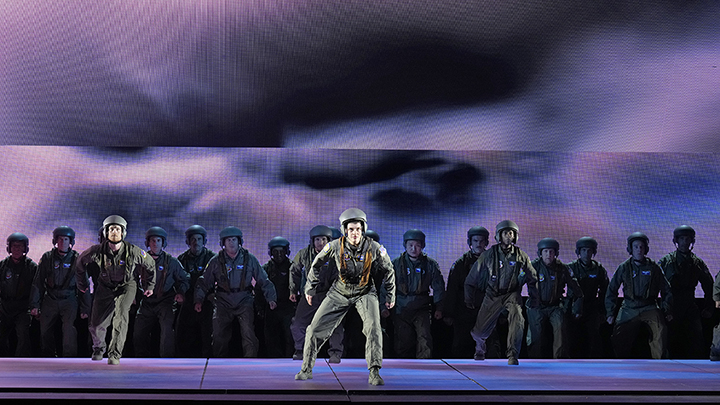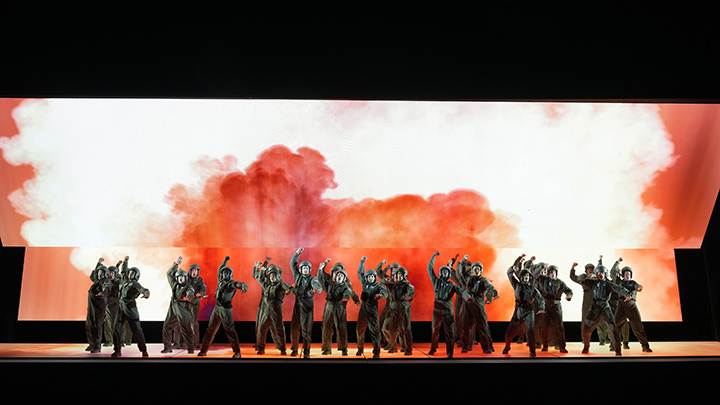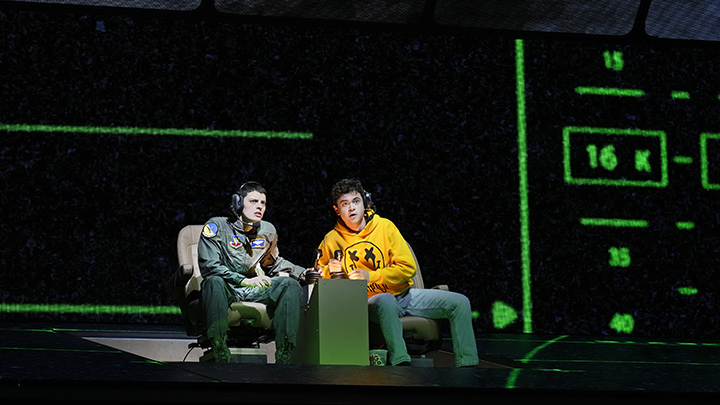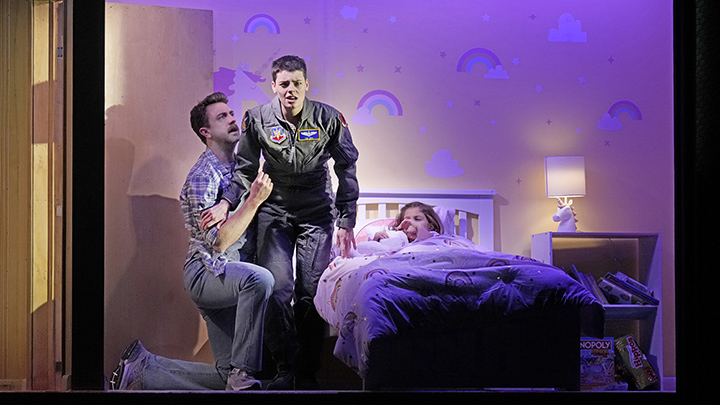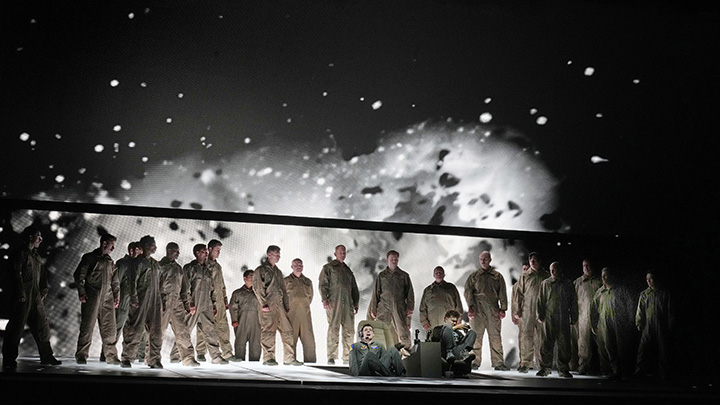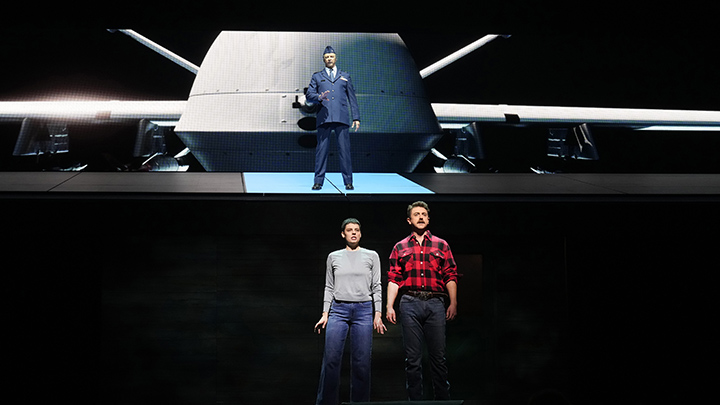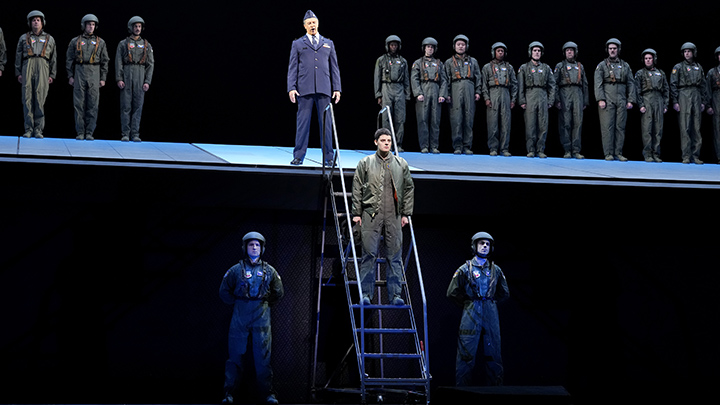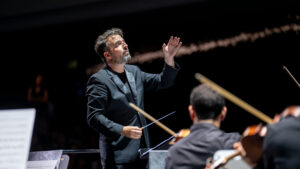War is a common theme in operas from the standard repertoire and contemporary works alike, from the clash between the Egyptians and Ethiopians that animates Giuseppe Verdi’s Aida to the retelling of the First World War’s Christmas truce at the heart of Kevin Puts’s Silent Night. Grounded, a new opera that will open the Metropolitan Opera’s season on Monday and had its world premiere with the Washington National Opera (WNO) last year, brings this subject into the 21st century. Composed by Jeanine Tesori, the opera is based on a one-woman play by George Brant, who also wrote the libretto. The creative team has made updates to the opera following its WNO run, which they discussed recently with the New York Times and Playbill. Mezzo-soprano Emily D’Angelo, returning from the WNO production, stars as Jess, a U.S. Air Force (USAF) F-16 fighter pilot reassigned as a drone operator after becoming a mother. Grounded addresses topics including gender in the U.S. military and the psychological trauma of warfighting.
The U.S. military setting in Grounded may be unfamiliar to some opera fans. Grounded makes its Met debut at a time of growing separation and even misunderstanding between the general public and the military, a dynamic referred to as the civil-military divide that has implications for democracy. Fewer Americans have direct engagement with the military now than in the past, which can leave the public less informed about issues affecting servicemembers, as represented by Jess. Since the end of the draft and the advent of the all-volunteer force in 1973, a smaller percentage of Americans have increasingly taken on the sacrifice of defending the nation.
In 1980, veterans accounted for 18 percent of the population, compared to six percent in 2022, according to the Census Bureau, and the Pew Research Center found in 2011 that 75 percent of Americans with an immediate family member in the military believed that the general public did not have a good understanding of the challenges servicemembers go through. Members of the military disproportionately come from the same families, a dynamic described by the Center for a New American Security, a Democratic-leaning think tank, in a 2017 report as the creation of a “warrior caste.” The concentration of military service in certain families means that many communities may not have exposure to members of the military in their daily lives. Grounded offers an intimate perspective of the impact of warfare that some viewers may not find elsewhere. The production, aided by director Michael Mayer’s two enormous LED screens, also brings the audience face-to-face with the weapons of war being fielded in the name of national defense.
WNO was perhaps a natural fit to premiere Grounded. The Kennedy Center is less than four miles from the Pentagon, due south across the Potomac River. The buildings are about a half-hour apart on the Washington Metro, which is to my knowledge the only subway in the nation or perhaps the world that features advertisements for weapons systems and other materiel (predominantly in the Pentagon station – you never know which acquisitions professionals are taking public transit to work, I suppose). Defense contractors play a major role in the economy of the national capital region; these companies are top employers and corporate sponsors for philanthropic causes. General Dynamics’ long-standing sponsorship of WNO raised eyebrows for some observers and critics last year in relation to the company’s production of Grounded.
In an audience note, WNO stated that “For the sake of clarity, no sponsor or supporter of WNO had any involvement in the creation of Grounded or in the contents of its libretto.” The drone piloted by Jess in the opera, the MQ-9 Reaper, and its predecessor, the MQ-1 Predator, are manufactured by a different company, General Atomics, which has been privately held since the 1980s. These models are the preeminent drones used for U.S. counterterrorism missions. Compared to other opera companies, the WNO audience is more likely to include those familiar with the military by virtue of living in the DC area, members of the armed forces, and even those officials responsible for making decisions relating to drone warfare. In DC, WNO engaged in extensive outreach to the military community in association with the production. I am curious how Grounded will be received by a broader public that lacks the WNO audience’s background knowledge of the opera’s context.
The first thing to understand about Grounded’s central character, Jess, is that she didn’t get where she is easily. Becoming a USAF pilot requires years of dedication: prospective pilots must first complete officer training via ROTC, the Air Force Academy, or Officer Training School, and then comes undergraduate pilot training and flight training, which lasts about a year. After that, candidates are assigned the specific aircraft on which they will serve, and six months to a year of training follows. Pilots account for a small slice of the USAF’s personnel, and the percentage of pilots who are women lags that for the force as a whole. As of this year, the USAF reports employing 11,921 pilots, of whom 1,089, or about nine percent, are women. The USAF and the Space Force (which is administratively part of the Department of the Air Force) count 321,103 active-duty servicemembers, of which 21.5 percent are women.
Jess isn’t simply a pilot, however. She is a fighter pilot, an elite rank attained by less than a third of USAF pilots. As of the end of fiscal year (FY) 2023, only 3,719 officers have this specialty, according to data shared by Air & Space Forces Magazine. The exact number of women serving as USAF fighter pilots in 2024 is difficult to find, but in recent years, figures from military sources have hovered around 100, less than three percent of the total. Jess has persevered through a grueling process to become one of only a few women to reach this rank. Operating drones, referred to in the opera as the “Chair Force,” does not enjoy the same prestige.
Women have served in the military since the American Revolution but were not permitted to hold permanent positions until the Women’s Armed Services Integration Act of 1948. The Pentagon began allowing women to fly Air Force and Navy fighter jets and serve on combat ships in 1993 and ultimately expanded eligibility for all military roles to women beginning on January 1, 2016. Women in the military confront a challenging culture, where “female” is often deployed as a noun and sexual assault remains a major problem. A Department of Defense (DOD) report released this year found that 6.8 percent of women serving in active duty experienced “unwanted sexual contact” in 2023. Brown University’s Watson Institute for International and Public Affairs has estimated that 24 percent of female servicemembers have experienced sexual assault on average since 9/11.
This is the environment that Jess enters as an F-16 pilot. Tesori’s use of a nearly entirely male cast effectively heightens the otherness of Jess as a woman serving in a male-dominated environment. Hers is the only female voice in Grounded, with the exception of her young daughter and the smaller role of a psychological alter ego that Jess manifests near the end of the first act. Jess’s mezzo-soprano stands out against the lower registers of the all-male chorus, which represents other airmen, prompting reflection on gender in the military. Despite the difficulties, this role brings Jess joy and pride, which she expresses in the opera’s standout first act aria “All for the Blue.”
The pivotal turning point of the first act comes when she becomes pregnant after sleeping with a rancher named Eric, tenor Ben Bliss, while on leave. Jess faces the choice of becoming a mother or remaining a pilot. The synopsis in WNO’s program puts it plainly: “Jess can keep the baby or keep flying.” Pentagon policies around pregnancy have historically been a barrier to military service for women. Until 1976, women were automatically discharged from the military after becoming pregnant. In 2022, the USAF releaseda policy clarification allowing pregnant pilots to continue flying. As of that year, the USAF reportedly was developing a maternity flight suit. These developments come too late to make a difference for Jess, however. She hangs up her flight suit.
Grounded does not dwell for long on the topic of abortion, and it’s understandable why Tesori and Brant may not have wanted to make such a hot-button issue a focus of an opera that already addresses weighty themes. Yet this aspect of the plot resonates differently in a post-Dobbs world. Abortion access for women in the military has become politically contentious. The opera’s chronology is loosely defined, but Brant’s play debuted in 2013, when abortion was protected as a constitutional right nationwide. As a result of the Supreme Court’s reversal of Roe v. Wade, abortion is now banned or restricted more tightly than Roe in 22 states, many of which are home to major military installations. The Biden administration has adopted a policy of reimbursing travel expenses for servicemembers who must leave their assigned postings to receive reproductive care, which Republicans in Congress have sought to overturn. Most notably, Senator Tommy Tuberville (R-AL) blocked all military promotions for 10 months last year in an unsuccessful bid to end the policy. Whether or how Grounded should have handled the issue of abortion differently is a question for individual viewers to determine for themselves, but the evolution of constitutional law since the opera’s source material was written adds another layer to the work.
When Jess returns to active duty, her Commander, bass-baritone Greer Grimsley, assigns her to operate a Reaper drone from a military installation outside Las Vegas. In the over two decades since 9/11, drones have become an increasingly common tool of the U.S. military. According to data referenced by the WNO in its program notes for Grounded, the Pentagon’s fleet of unmanned aerial vehicles (UAVs) increased tenfold between 2001 and 2012, growing from 70 to 7,000. President Obama oversaw a dramatic expansion in the use of drones for counterterrorism missions, particularly in countries not recognized as traditional battlefields: Pakistan, Somalia, and Yemen. Exact figures on the military’s use of drones are generally not available; an average of estimates calculated by a Brookings Institution fellow in 2016 suggested that Obama authorized over 500 drone strikes in those three countries, compared to 50 by President George W. Bush. Jess resumes her military service as drones are becoming mainstream weapons of war for the U.S. military.
It is difficult to understand drone operators’ experiences with precision, given the sensitivity of the work and restrictions on classified national security information. In his 2012 study of the labor of drone operators, which also informs the WNO’s program notes, New School media studies professor Peter M. Asaro provides one of the best academic perspectives on this black box. Asaro describes drone missions as having three key personnel: the pilot, who commands the aircraft; the sensor operator, who is responsible for the sensors, radar, and cameras, as well as targeting; and the mission intelligence coordinator, who handles communication with analysts and databases. In addition to Jess, Grounded also includes a character in the role of the Sensor, baritone Kyle Miller making his Met debut after originating the role in Washington. There is no major character explicitly performing the duties of mission intelligence coordinator but this function in the WNO production was included in the Kill Chain, a five-person chain of command. Grounded thus invites audiences into the drone control room, offering perhaps the realistic perspective available to those of us outside the national security establishment.
As the Global War on Terror grinded on, public support for U.S. boots on the ground eroded, and drones ostensibly offered a way to continue fighting terrorist groups at a lower cost in blood and treasure. Drone warfare is not cost-free, however. U.S. drone strikes, while responsible for eliminating high-value targets, have also resulted in many civilian casualties, the exact number of which is impossible to determine. In 2022, Brookings Institution researchers cited data from the Bureau of Investigative Journalism, a nongovernmental organization based in London, estimating that U.S. drone strikes killed between 10,000 and 17,000 people, including 800 to 1,750 civilians, in Afghanistan, Pakistan, Somalia, and Yemen between 2002 and 2020. A New York Times investigation in December 2021 revealed that U.S. drone strikes in the Middle East were characterized by “deeply flawed intelligence, rushed and often imprecise targeting, and the deaths of thousands of civilians” and found little evidence of reflection from the Pentagon on errors, no cases of disciplinary action for civilian casualties, and a sparse history of payments to victims of U.S. drone strikes. Secretary of Defense Lloyd J. Austin III announced policy changes aimed at better avoiding harms to civilians the following month.
Until the end of the second act, when Jess encounters a moral dilemma relating to her duty, Grounded largely does not address the ethics of drone warfare relating to civilian casualties. When I saw the opera in Washington, I would have been curious to hear Tesori expand more on this topic and apply the expressive power of her score to it. Greater and earlier treatment of this theme would have made a valuable addition to the opera, though it would be ambitious for a single work to cover so much ground. Most effective operas tightly follow a central storyline, and Grounded devotes the bulk of its focus to the mental repercussions of warfighting on an individual drone pilot. This intimate psychological portrait is what ultimately interested me most about the opera. Understandings of post-traumatic stress disorder (PTSD) have evolved considerably since the phenomenon described as “shell shock” was observed during the First World War.
Drone operators are not immune from the afflictions experienced by their counterparts in manned aircraft. As remote warfare becomes more common, the issue of mental health challenges among its practitioners will only become more urgent. A 2013 study conducted by the DOD found similar incidences of anxiety, depression, and post-traumatic stress among drone pilots as pilots of conventional aircraft in Iraq or Afghanistan. Other USAF surveys referenced by the New York Times found higher rates of PTSD and suicidal ideation among drone crews than servicemembers assigned to conventional aircraft. A USAF psychologist told the Times that PTSD risk is six to eight times higher after viewing one drone strike that kills civilians unexpectedly. One veteran has spoken out how operating drones left distinctive psychological scars. “People say that drone strikes are like mortar attacks,” former drone sensor operator Brandon Bryant told NBC News Chief Foreign Correspondent Richard Engel in 2013. “Well, artillery doesn’t see this. Artillery doesn’t see the results of their actions. It’s really more intimate for us, because we see everything.” It lingers with him, he said in the interview. “I can see every little pixel if I just close my eyes.”
Bryant could be talking about Jess, and indeed, his interview, an uncommon example of a drone operator speaking openly about the work, was also quoted in the WNO’s program notes. Grounded seeks to convey the psychological toll of her service as a drone operator. The Commander tells Jess that her new assignment offers “war with all the benefits of home,” as she will be able to go home to her family every night after completing her 12-hour shifts. This dichotomy between warfighting and domestic life provides unique stresses for drone operators. Asaro, the New School professor, describes this dynamic as the worst of both worlds. “For those who do experience combat stress, there is little chance that they would find comfort and shared understanding among the civilian population, and there are many powerful cultural forces within the military that would prevent them from discussing it with military colleagues.”
Jess is left isolated and by the end of the first act, begins to see a disassociated psychological double, credited as “Also Jess.” The choice to write this role for a soprano voice distances her from Jess sonically and sets Also Jess apart from reality, giving the audience insight into Jess’s mental state. In her evolution of Jess’s character and the fracturing of Jess’s psyche, Tesori offers a reinterpretation of the operatic trope of a woman going mad. She replaces the convention of the “mad scene” as in the archetypical example of Gaetano Donizetti’s Lucia di Lammermoor with a sympathetic perspective of the trauma that results from participation in combat. This simultaneously links Grounded to past works while expanding the operatic tradition to fit a new type of protagonist.
In the opera’s finale, Jess is ordered to strike the second-highest target on her list, but as she looks at the image on her screen, ready to fire, a young girl runs towards him. Traumatized from her experience with combat as a drone pilot, Jess associates this girl with her own daughter–and she faces a split-second decision. For those wishing to see the opera, I will abstain from spoiling the ending completely, but it led me to reflect more deeply on the themes of the work.
Some might say that this opera is arriving 10 years too late. Counterterrorism is no longer the chief preoccupation of the U.S. national security establishment. Every presidential administration releases a National Security Strategy at least once to highlight the federal government’s top foreign-policy priorities. President Biden’s 2022 strategy concentrated on strategic competition with China and Russia, relegating terrorism to six paragraphs 30 pages in. This continues a shift initiated in former President Trump’s 2017 strategy, which identified Beijing and Moscow as “revisionist powers” and reoriented U.S. foreign policy away from the Middle East. In 2021, Biden ended the country’s longest war, withdrawing U.S. troops from Afghanistan after nearly 20 years of military intervention. Obama famously proclaimed a “pivot to Asia” during his presidency, which now appears to be happening.
Why present Grounded now? Though drone warfare no longer occupies the headlines to the extent it once did, the issue still exists. As the United States reduces its military footprint in the Middle East, drones will remain a key tool for the DOD. In remarks at the White House after the Afghanistan withdrawal, Biden outlined the future of U.S. counterterrorism as an “over-the-horizon capability that will allow us to keep our eyes firmly fixed on any direct threats to the United States in the region and to act quickly and decisively if needed,” i.e., a greater reliance on airstrikes, which is likely to include drones, in the absence of a military presence on the ground.
The 2022 killing of Al Qaeda leader Ayman al-Zawahiri by a drone strike in Afghanistan provided an early example of Biden’s approach being put into practice. Last week’s announcement of a deal to bring home most U.S. troops in Iraq by 2026 further underscores this issue. Moreover, rules of engagement for targeted killings of individuals suspected of terrorism outside of recognized conflict zones have shifted with the political tides over the years. In 2013, Obama announced a policy of authorizing drone strikes with “near-certainty” of no civilian injuries or deaths. Trump weakened the legal standard in 2017 and Biden tightened it again in 2022. The future of drone warfare for the Pentagon is subject to change and will be determined by this year’s presidential election.
It is far too soon to opine on whether Grounded might gain a foothold in the standard repertoire of contemporary opera after its premiere on Monday (a review on parterre will follow in October), but its subject is poised to remain relevant. Some viewers expecting an earlier and more in-depth exploration of the ethics of killing in war via drone may be left disappointed and wanting more, though Grounded does address this topic at the end. The opera’s creators chose to focus more closely on the impact of war on Jess’s psyche, and Grounded succeeds in conveying her complex reaction to a new method of fighting wars that is here to stay. Tesori’s opera reaches across the civil-military divide, introducing the audience to the difficult realities faced by drone operators, often overlooked in the popular imagination. Grounded’s characterization of Jess encourages empathy for the sacrifices made by those in uniform, the challenges faced by women in the military, and the psychological costs suffered by those serving in the unique role of drone operators.
Photos: Ken Howard

